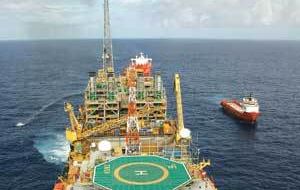MercoPress. South Atlantic News Agency
Petrobas begins operations with extra heavy oil
 Petrobras P-48 FPSO
Petrobras P-48 FPSO Brazil's government managed oil corporation Petrobras announced Tuesday that its first oil rig designed to produce extra heavy petroleum went online on Tuesday. The special rig is located in the Badejo field in the Campos basin, off Rio do Janeiro according to a release from Petrobras.
"Turning resources into richness is a Petrobras mission, and, from the onset of the project, the company once again showed its power of achievement by producing the first oil at the Siri reservoir. That is why I consider this day the first day of the future," said Petrobras' Exploration & Production director, Guilherme Estrella, during the ceremony. The unit, installed at a water depth of 95 meters and 80 kilometers off the coast, will be used as a pilot production project for the Siri reservoir, which is located in that field. The FPSO (floating oil production, storage and off-loading system) type platform is expected to produce 15.000 barrels of oil per day (bpd), and will be capable of processing 12.8 degree API (measure of density) oil in reservoir conditions, which characterizes this as the heaviest and most viscous oil produced in offshore fields in Brazil. The data collected during the testing phase will be used in that reservoir's definitive development project, which foresees the drilling of several wells and the installation, at a later stage, of a new platform. More than a new production system, the FPSO Cidade de Rio das Ostras will be a lab for the development of other offshore extra-heavy oil fields, such as Marlim Leste, Albacora Leste, Papa-Terra, and Maromba, all located in the Campos Basin. Chartered from Canadian-Norwegian outfit Teekay-Petrojarl, the new platform is an oil tanker converted into an FPSO. Over and beyond producing up to 15,000 barrels per day, it is capable of storing up to 200,000 barrels. The technology used in the project was developed by Petrobras' Research Center (Cenpes). It has been known there is oil in the Siri reservoir since 1975, yet, since the first tests showed very low oil flow, until recently production was not considered economically viable. However new technologies allowed production to take place, with the construction of a 2-kilometer horizontal section well and the installation of a high-power submerged submarine centrifugal pump (SSCP) to ensure high oil flow rates. Other challenges that had to be overcome were separating the water and the gas that are produced, in addition to the hurdles involved in processing this type of oil, which requires high operating temperatures (140ºC).




Top Comments
Disclaimer & comment rulesCommenting for this story is now closed.
If you have a Facebook account, become a fan and comment on our Facebook Page!